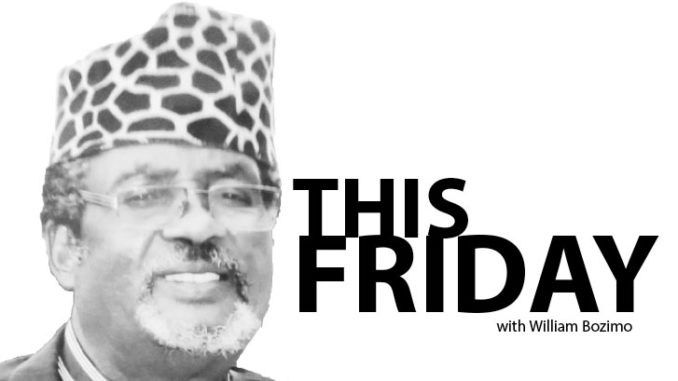
Prince Charles, the heir apparent to the British Crown in the United Kingdom, was in Nigeria and called at the Aso Villa to discuss issues of national interest like Fulani herders conflicts with farmers and the resultant murders and burning down of homes of farmers.
As a first son taking over from his mother, the Queen of the United Kingdom and head of the Commonwealth, many described his visit as a sad reminder of the colonial days where Britain gave independence to Nigeria on a platter of gold without bloodshed like other climes.
The aspect of his visit that provoked commentaries was the large assemblage of Nigeria’s traditional rulers who were drafted, as it were, to meet the Crown Prince Charles as a body of powerless rulers from their states.
We also found in the Facebook his visit to Ghana where he was compelled to meet the traditional Ruler there in his palace with his wife, with the King seated on a resplendent Chair adorned in Golden colours.
Agreed, Nigeria is a bigger country with more than a thousand traditional rulers of their ethnic clans and little kingdoms which made them look slightly easy to manipulate by the federal government of the day.
During the Independence Day, lowering of the Union Jack at the Race Course, now renamed Tafawa Balewa Square was jubilation galore in Lagos, with many school children and politicians jubilating that they had finally won Independence from Britain and the Queen Elizabeth of the United Kingdom.
We can also recall that Ghana got its independence in 1957 three years ahead of Nigeria. Dr Kwame Nkrumah was president of Ghana in 1957 while Tafawa Balewa was the first Prime Minister of Nigeria at independence in 1960, October 1st.
For whatever it was worth, the lingering colonial ties with Britain is not something Nigeria could wish away too soon. What was missing during the visit of Prince Charles was the absence of Mrs. Aisha Buhari for purposes of photo shooting experience and for the records for posterity that she was the First Lady of Nigeria when Prince Charles called at the Aso Villa, Abuja. The fact that she had been sentenced to the Kitchen and the Other Room should not bar her from jointly receiving foreign dignitaries.
The political significance of the visit of Prince Charles will go a long way in cementing the U.K.- Nigeria relations for many years to come. As the new heir apparent to the Commonwealth of Nations, there is no way Nigeria could wean itself from the glorious colonial ties of the past many years after Independence.
A few of the highlights of the visit were the presentation of books by two Nigerian traditional rulers. The Oba of Benin, EWUARE, gave a book titled, ‘the Anthology of Benin Kingdom to the British Prince. In a similar show of fraternal relationship with the Caliphate, the Sultan of Sokoto, Saad Abubakar II, also presented a book to Prince Charles in Abuja.
The Oba of Benin, during a one on one discussion with Prince Charles requested the return of Bini artifacts stolen by British troops during the invasion of the Benin City in the early 19th century. For the Sultan, memories of Indirect rule emanated from the Northern Kingdoms through whom the British Colonial Masters were able to keep the restive natives in check.
The British had always had a soft spot for the Northern elements. They were more pliable and regarded as not too educationally advanced like the Igbos and the Yorubas who were interested in hastening the independence of Nigeria.
Anglo- Nigeria relations was once almost ruptured during the tenure of the military regime of Maj Gen. Muhammadu Buhari in 1984, when an aborted attempt was made to abduct a former Minister of Transport, Alhaji Umaru Dikko from the UK but the clever British police discovered the attempt and foiled the abduction saga of a prominent Nigerian Politician.
Is it not ironic that today President Buhari, a reformed former military dictator is now receiving Prince Charles and his wife Carmila at the Aso Villa.
For most Nigerian elites, they see the UK as their second home; most of them have houses in London where they often retire to during summer holidays. The Summer attraction for Nigerians in the UK has become so obsessive that showing up in London has become a status symbol for many ‘beentos’ who could tell you proudly that instead of eating the Nigerian delicacy of EBA they have turned out to become eaters of ‘GROUND RICE’ in place of Eba.
Besides such culinary delicacies, ‘Fish and Chips’ is another favourite of Nigerians with ketch-up for seasoning. On a larger level, educational institutions had played major roles in the UK- Nigeria relations as the University of Ibadan, Nigeria’s premier University, had its early beginnings from the UK with an affiliation to London University.
Prince Charles, after parting ways with his first wife, Lady Diana, he has aged graciously and now more matured than his earlier days as a play boy from the Western World.
Prince Charles, now a father to Prince Williams and Harry, has endured the many years of waiting to succeed his Mother, Queen Elizabeth, who recently announced him as the heir apparent to the British Throne and Head of the Commonwealth Nations, which went through British colonial experiences and tutelage.
END

Be the first to comment